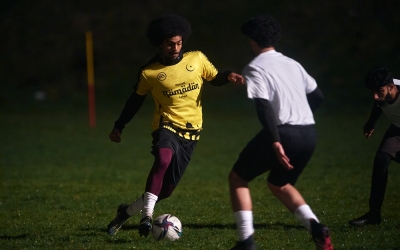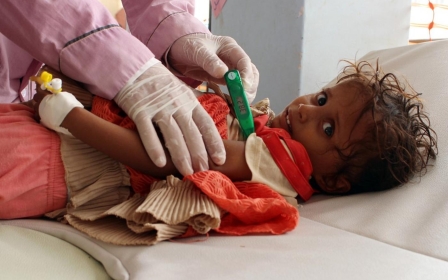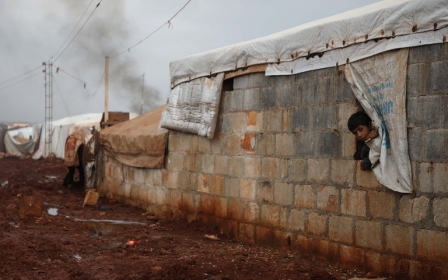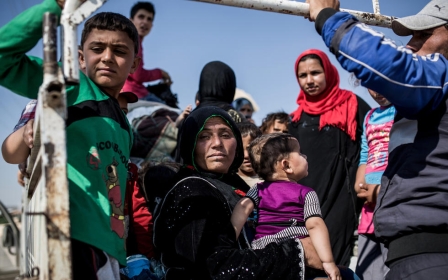UK regulator refused to investigate Muslim charity's complaints of police harassment
The UK's Charity Commission refused to examine a Muslim aid charity’s complaints of harassment of its staff by police and security agencies as part of an investigation into alleged mismanagement, Middle East Eye has learnt.
In a report published on Thursday, the Charity Commission, which is an independent British government department, said it had found evidence of misconduct and mismanagement at Human Aid in relation to the organisation's use of cash couriers to send money to Gaza in 2019 and its work with a former Turkish partner organisation sending aid to Syria.
But the regulator said trustees at the London-based charity had “taken positive steps to address the failures and weaknesses in the Charity’s governance” and “shown a willingness to take on board the regulatory advice and guidance provided by the Commission”.
In a statement, Human Aid said it welcomed the closure of the inquiry. But it accused the Commission of “being excessive in its approach and effectively acting as an extension of police and security services harassment policy”.
It accused the Commission of using “defamatory and inaccurate” language in the report and said it had requested a meeting with the Commission and other Muslim charities to discuss what it described as “a problem of bias and Islamophobia”.
New MEE newsletter: Jerusalem Dispatch
Sign up to get the latest insights and analysis on Israel-Palestine, alongside Turkey Unpacked and other MEE newsletters
A spokesperson for the Charity Commission told MEE it strongly rejected any suggestion of bias in its investigative work. The spokesperson said it had asked the charity for more details about the proposed meeting.
The regulator opened a statutory inquiry into Human Aid in August 2019, days after police confiscated about £15,000 ($20,000) in cash from a charity staff member and volunteers, under Schedule 7 counter-terrorism powers at Heathrow Airport. The staff member and volunteers were on an aid mission to Gaza.
The charity was already subject to Charity Commission monitoring following an earlier inquiry, which highlighted concerns about Human Aid’s work with partners delivering aid to Syria via Turkey.
The commission has also issued regulatory advice against the use of cash couriers. MEE has previously reported on how cash seizures were used by police to disrupt aid convoys to Syria.
Human Aid called for the inquiry to be dropped in May 2020, after police returned the money and acknowledged it was legitimate charity funds.
The charity also accused police of abuse of power and harassment. It says its staff and volunteers have been regularly detained, searched and questioned, and required to hand over electronic devices and provide fingerprints and DNA samples during Schedule 7 stops at ports and airports.
MEE understands that Human Aid submitted evidence to the Charity Commission of alleged harassment of its staff by police and security agencies.
This included a report originally filed to the regulator in January 2019 describing an incident at a police station in which a member of the charity’s staff said he was threatened with arrest by a police officer and another man, who he understood to be “someone from MI5”, the British government's domestic spy agency.
Staff 'leaving out of fear'
The Charity Commission told the charity during the inquiry that complaints against the police and security services were a “matter for the trustees to address with them via their respective complaints procedures and processes”.
Nur Choudhury, the chair of Human Aid, told MEE that many Muslim charities were facing “more and more scrutiny, especially when our work may not necessarily be in line with UK foreign policy”.
“If we are raising complaints about harassment we should be supported by the Commission,” said Choudhury.
“Harassment has led to staff leaving work out of fear. We have had staff who have required further support because it has affected their mental health. Naturally that has had an impact on our work.”
The incident report submitted by Human Aid described a meeting attended by the charity’s employee at Charing Cross Police Station in central London on 3 January 2019.
The employee had previously been questioned by police during a Schedule 7 stop at Gatwick Airport in August 2018, at which his electronic devices were confiscated.
According to the report, when he went to collect his devices from Ilford Police Station in East London the following week he was approached by a police officer called Warren, who told him that aid sent from the UK to Syria was “being used for terrorist purposes” and asked him for information.
Warren made several further attempts to contact him over the next few months. On 2 January 2019, the employee received a phone call from Warren asking him to meet regarding an urgent matter. He agreed to go to Charing Cross Police Station the next day.
When the employee arrived at the police station with his lawyer, Warren told him he would only speak to him alone, the report said. The employee eventually agreed to this and entered a room “where Warren is present, alongside an unknown person, believed to be someone from MI5”.
Warren then told the employee that Human Aid was working with a Turkish charity he alleged was linked to al-Qaeda. “When the arrests are made you will be the main person we arrest,” he told him, according to the report.
'Support to al-Qaeda aligned individuals'
In response to the incident, Human Aid stopped working with the Turkish charity and instructed lawyers to “contact Scotland Yard in writing to get clarity on the secret meeting… and obtain further information or evidence regarding their assertions”.
The Charity Commission’s report acknowledges Human Aid flagged up concerns about its Turkish partner in January 2019 and took immediate action to end its relationship with the organisation, but it does not mention the circumstances that prompted the charity to take this action.
It said concerns about the Turkish charity were later raised directly with the regulator by the police in April 2019, who described it as “being used to provide support to al-Qaeda aligned individuals in Syria”.
The phrase “al-Qaeda-aligned” is often used by British intelligence agencies to refer to people and groups it assesses to be linked to Hay’at Tahrir al-Sham (HTS), the dominant militant group in opposition-held Idlib province, which contains factions formerly affiliated with al-Qaeda. HTS is a proscribed organisation in the UK.
The Charity Commission also said it found evidence of misconduct in Human Aid’s relationship with its former Turkish partner because it said trustees had failed to supply adequate records to account for almost £250,000 ($340,000) sent to the charity during 2018.
A spokesperson for the Turkish charity, which MEE is not naming, denied that the charity was linked to al-Qaeda. He told MEE the charity was set up to help Syrians and had funded work supporting orphans and treating the war-wounded in opposition-held Syria.
But he said the charity stopped working in 2019 after bringing a complaint in Turkey against a Syrian man it accused of misappropriating funds.
Choudhury told MEE Human Aid had received no further evidence from police to support the allegation of the Turkish charity’s links to al-Qaeda.
A spokesperson for the Charity Commission told MEE: "The report published today explains why we opened an inquiry into Human Aid UK, and lays out the serious findings the inquiry made, which speak for themselves.
"We strongly reject any suggestion of bias in our investigative work. The Commission assesses all concerns raised with us fairly and consistently in line with a published risk framework.
"The framework explains how we determine whether a concern or issue requires our regulatory involvement, and if so what the appropriate response is. We are clear that our investigations do not focus on any specific religious classification."
MEE has also contacted the Metropolitan Police for comment.
Middle East Eye delivers independent and unrivalled coverage and analysis of the Middle East, North Africa and beyond. To learn more about republishing this content and the associated fees, please fill out this form. More about MEE can be found here.






